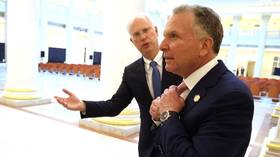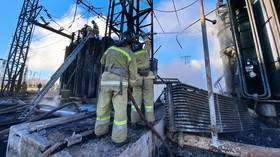Judge said Assange hearing needs a translator fluent in 'Australian' – report

The presiding judge in WikiLeaks co-founder Julian Assange's case against the Ecuadorian Foreign Ministry has reportedly said that the court made a mistake by appointing an English translator who doesn't speak Australian.
The anecdote was reported by Bloomberg on Thursday and allegedly took place at the first hearing of Assange's lawsuit against the ministry. Speaking via video link, Australian-born Assange complained to the court that his state-appointed translator from English to Spanish was not cutting it.
It's unclear what exactly the issue was, but Judge Karina Martinez apparently thought Assange's Australian accent was thick enough to warrant a dedicated expert.
While Australian English is the most spoken dialect Down Under, it is by no means a separate language. The Australian dialect originated in the late 18th and early 19th century from convicts who were the first British settlers to arrive in New South Wales.
Admittedly, the Australian vernacular is quite distinct, has rich slang, and peculiar terms. Differences in pronunciation and vocabulary can at times leave an average British or American English speaker perplexed.
Assange's accent, however, is far from the thickest around.
Last week, he filed a lawsuit against Ecuador's Foreign Minister Jose Valencia, accusing the government of violating his "fundamental rights and freedoms" with a set of new rules. The government files released by an Ecuadorian opposition lawmaker last Tuesday outline the efforts of the Latin American country to prevent Assange from engaging in activities that "could be considered political or interfering with the internal affairs of other states."
They also limit Assange's visitation rights, force him to pay his own medical bills, and even threaten to take away his cat if he doesn't look after it properly.
Assange's lawyer, Baltasar Garzon, has accused Valencia of "isolating and muzzling" the fugitive, himself an Ecuadorian citizen since December 2017. Garzon said Assange still has no access to the internet, despite Ecuador's earlier announcement it would restore communications.
Valencia insists that the government's treatment of Assange, including the new restrictions, are "in line with international standards and Ecuadorian law."
Assange's fate has become uncertain since current Ecuadorian President Lenin Moreno assumed power in May 2018, replacing his estranged mentor Rafael Correa, who granted Assange asylum back in 2012.
Moreno, who has called Assange "more than a nuisance" and an "inherited problem," had reportedly discussed with the British authorities a potential way out of the situation by which Assange can vacate the premises, without being extradited to the US where he might face treason charges. Correa, meanwhile, believes Ecuador is poised to turn Assange over to the US.
Like this story? Share it with a friend!















